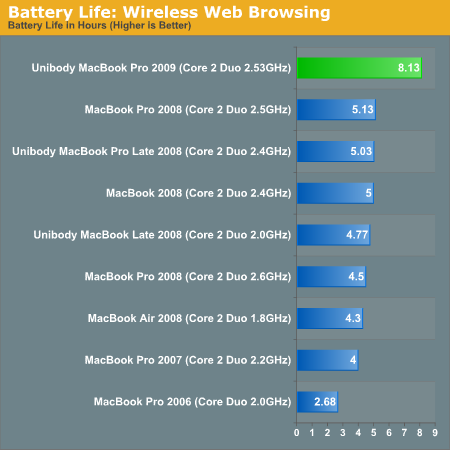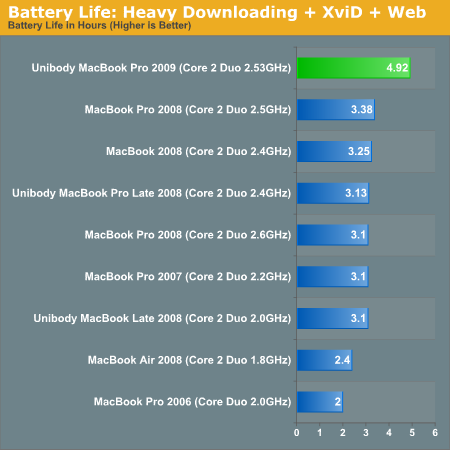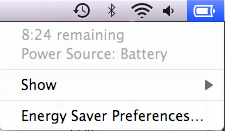Apple's 2009 MacBook Pro: Battery Life to Die For
by Anand Lal Shimpi on June 12, 2009 12:00 AM EST- Posted in
- Mac
The Best Battery Life I’ve Ever Seen
To find out how well the new lithium polymer battery does I ran my usual suite of Mac battery life tests. First up was my wireless web browsing test:
The wireless web browsing test uses the 802.11n connection to browse a series of 20 web pages varying in size, spending 20 seconds on each page (I timed how long it takes me to read a page on Digg and came up with 36 seconds; I standardized on 20 seconds for the test to make things a little more stressful). The test continues to loop all while playing MP3s in iTunes.
This is an extremely light test as none of the web pages have any flash ads, but it’s a valid test of very light wireless usage.

Eight, freakin, hours. I couldn't believe it. In my lightest test, the new 15-inch MacBook Pro lasted eight hours and eight minutes. That's with the screen at half brightness (completely usable) and no funny optimizations. The notebook is just playing music and surfing through a lot of my old reviews. There's no way this could be right. Maybe my test was too light?
I threw together another test just to make sure. The key flaw in my initial wireless web browsing test is that it none of web pages have any Flash on them. While constantly loading web pages will ensure the CPU can't go into deep sleep, Flash on the pages would make sure that the CPU utilization remains higher at all times. The next test I put together was this:
I strung together 8 reviews on AnandTech and put them each on a single page, images and all. I then scoured the web for big, animated Flash ads and added anywhere from 1 - 4 ads per page; all Flash. Each page is designed to forward to the next after 10 seconds and the loop continues indefinitely. On each machine I opened three Safari windows and pointed them at the first page in the sequence. In the background, once more, I had iTunes playing MP3s.
I found that CPU utilization varied from 5 - 35% during this test, which is about what I saw when I was actually surfing the web myself. The addition of Flash should make it more stressful, but it's still a fairly light usage test. My original web browsing test got us 8 hours, so what about this new one?
| MacBook Pro 2009 | MacBook Pro Late 2008 | |
| Wireless Web Browsing w/ Flash | 6.48 hours | 3.28 hours |
Six and a half hours, out of a 5.5 lbs notebook. For comparison, the older MacBook Pro could only manage 3 hours and 17 minutes in the same test. The new notebook lasted almost twice as long. Mathematically, this doesn't make sense. There's only a 46% increase in battery capacity, there shouldn’t be a ~100% increase in battery life...ever.
While the original web browsing test was using data from my original unibody MacBook Pro review, this second web test used a brand new MacBook Pro (purchased just weeks before this week's MacBook Pro announcement). The two notebooks had the same amount of memory (4GB), the older MacBook Pro had a slower CPU (2.4GHz vs. 2.53GHz) and a 7200RPM hard drive but the differences shouldn’t account for an extra 54% increase in battery life.
Apple must have done more than just increase battery capacity in the new MacBook Pro. My third test continues to support my findings. This is my heavy workload benchmark.
For this benchmark I'm downloading 10GB worth of files from the net (constant writes to the drive), browsing the web (same test as the first one) and watching the first two episodes of Firefly encoded in a 480p XviD format (Quicktime is set to loop the content until the system dies).
The older MacBook Pro managed 3.25 hours in this test. The new one? Just under 5:

That's a 51% improvement in battery life. It's close enough to the max theoretical 46% improvement for me to think that the significant gains in wireless web browsing are due to improvements in idle power optimizations. It's possible that all of the components in the new MacBook Pro have been optimized for lower voltages at idle.
The battery tests are repeatable however. I saw anywhere from a 50 - 100% improvement in battery life over the old MacBook Pro. Given the increase in battery capacity alone, you should see no less than a 46% increase in battery life. Exactly what is accounting for the expanded life above and beyond that, I'm not sure.
Either way, Apple's 7 hour claim is well within reason. For light workloads, even on WiFi, you can easily expect 6.5 - 8 hours out of the new 15-inch MBP. As I write this article on that very system I'm told that I have nearly 8.5 hours left on my charge. If you do a lot of writing on your notebook, the new MBP is exactly what you'll want; it will easily last you on a cross-country flight if you need to get work done.

I think I've just found my new writer's companion
My heaviest workload delivered just under 5 hours of battery life, a figure that the old MBP could only attain while running my lightest workload. This thing rocks.
I also have to commend Apple for delivering realistic battery life specs on its laptop. While 7 hours definitely involves a light workload, it is more than attainable as I've shown in the tests above.
A quick search shows that even Dell's Studio 15 only offers a battery rating of up to 5.5 hours. It looks like, once again, other notebook makers will have to play catch up to Apple in this department.










113 Comments
View All Comments
Anand Lal Shimpi - Friday, June 12, 2009 - link
The 9600M was not present in the MBP I tested. I bought the entry level $1699 one.Take care,
Anand
ImSpartacus - Friday, June 12, 2009 - link
Yeah, I don't like that Apple doesn't say exactly what kind of processors they offer. It's depressing.Why can't AT tell us what processor the MBP has? Couldn't you just run CPUZ on Windows or something? Is it harder than I think it is?
aeternitas - Friday, June 12, 2009 - link
Apple isn't made for people that care that much about that stuff. It just doesn't matter. Faster = Faster. Expensive or not, not everyone wants to hax their way to OS X on a built PC either. Its not depressing, its simplistic and works.PlasmaBomb - Friday, June 12, 2009 - link
I should have checked wikipedia.http://en.wikipedia.org/wiki/MacBook_Pro">http://en.wikipedia.org/wiki/MacBook_Pro
Processors used in the mid '09 refresh are - 2.26GHz (P8400), 2.53GHz (P8700), 2.66GHz (P8800) Intel Core 2 Duo with 3MB on-chip L2 cache or 2.8GHz (P9700) Intel Core 2 Duo with 6MB on-chip L2 cache.
There is also an optional to upgrade from the 2.8GHz chip to a 3.06GHz (T9900) with 6MB on-chip L2 cache (costs $300).
JarredWalton - Friday, June 12, 2009 - link
Worth noting is that the P series CPUs (P8400-P8800) are generally 25W TDP while the T series (T9400-T9900) are 35W TDP. I think that's correct. Anyway, one thing that likely changed with these new MacBooks is that Apple switched to the lower TDP CPUs. Perhaps Anand can confirm?chrone - Saturday, June 13, 2009 - link
intel atom combined with this unibody batteray will do 24hours rock solid macbook mini. lol :D hope they bring that to netbook.ltcommanderdata - Friday, June 12, 2009 - link
The previous Late 2008 Unibody's 2.4GHz processor was also a P series with 25W TDP so it isn't a matter of just using lower TDP processors since it's unchanged.It would be interesting if Anand could do a battery life comparison in Windows under Boot Camp comparing the new MacBook Pro with the previous Late 2008 Unibody. If the margins remain the same between the models, then the optimization is likely in the firmware of the various components or the processor has been undervolted. If the battery life improvement margin falls in Windows, then the optimizations are in OS X.
PlasmaBomb - Friday, June 12, 2009 - link
Good call :)ltcommanderdata - Friday, June 12, 2009 - link
Actually, if you look at Apple's publicly listed processor specs for the 2.53GHz model, I'm pretty sure there is only one processor it can be. Apple quotes the 2.53GHz Core 2 Duo as having 3MB L2 cache. That makes it a P8700. The older T9400 and P9500 had 6MB L2 cache. Similarly the 2.66GHz Core 2 Duo is the P8800 just released by Intel since it too has 3MB L2 cache.PlasmaBomb - Friday, June 12, 2009 - link
Thanks, it does indeed state the cache sizes on the site under tech. spec., however the older spec. isn't there any more and you have to look.It is of interest as the '08 macbook ran a T9400 @2.53 GHz (35W), and the early '09 macbook ran a T9559 @ 2.66 GHz (35W).
So there should be a greater improvement in CPU heavy tasks between the early '09 and mid '09 2.66 GHz MBPs (although not covered by this review).